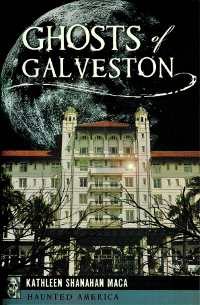Q&A with the author of “Ghosts of Galveston”
Kathleen Shanahan Maca is the author of the newest book on Galveston’s rich diversity of haunted properties and locales. She is also author of Galveston’s Broadway Cemeteries. We recently posed the following questions about the new book.
 What made you decide to write “Ghosts of Galveston?”
What made you decide to write “Ghosts of Galveston?”
I’ve always loved a good ghost story/ghost tour/reportedly haunted site. But when I was writing my book “Galveston’s Broadway Cemeteries,” I had quite a lot of people ask if I was uncovering any good ghost stories. People tend to associate cemeteries with ghosts. I received a lot of encouragement to make that my next project.
Which ghost story in the book frightened you the most, personally? Why?
Hmmm, that’s a tough question. There are few malevolent hauntings on the island, but one of them is “Charlie” at the Merchant’s Mutual Insurance Building. He doesn’t seem to want people in “his” building, and even makes animals uncomfortable.
According to your research, what would you consider to be the most haunted location in Galveston?
Can I say the entire island? Ha ha. As far as haunted areas, the Strand seems to be heavily “populated” with spirits of those who refuse to move on. Just about every building has at least one resident ghost. For a single location I would have to choose the Hotel Galvez for its array of ghosts.
What is the most surprising thing you learned while researching and writing “Ghosts of Galveston?”
Probably the most shocking thing, and certainly morbid, were the police descriptions of William Watson who was beheaded by a train. Everything right down to the color of his underwear (and many gorey details) were recorded. I also found it surprising that some of the most shocking murders in the island’s history have absolutely no ghostly tales connected to them.
Have you ever had any personal ‘ghostly’ experiences here in Galveston?
I absolutely have — a surprisingly blatant encounter that couldn’t be “reasoned away.” Luckily one of my friends was with me at the time, and others witnessed it as well. Unfortunately it was on the property of someone who doesn’t want the event publicized, so I am certainly going to respect that.
Your books are known for being meticulously researched. Where and how to you do your most productive historical research?
Thank you. The research is definitely the most challenging and enjoyable part of the process for me. I had to use a different approach for this project than I usually do, though. Once I gathered the stories (I think there were about 90 that I ended up with), I needed to come up with some way to narrow down which ones I chose to use. I decided that any story included should: 1. Have a researchable basis in fact (people actually existed, events actually occurred), 2. Be a site that still exists in some form that can be visited.
I read years worth of old newspapers, most of which I accessed through the Rosenberg Library databases; went to the county courthouse to review maps, court records and land records; and of course used the resources of the Galveston and Texas History Center. Beyond that I interviewed people who had experiences with hauntings, live or work at the haunted locations; or whose families were involved. Those interviews helped round out the more static research.
How long did you work on this book?
I spent a bit over a year collecting the stories, interviewing people and doing background research, doing a bit of writing along the way. Then the book took another couple of months to finish. Collecting the photos is always a challenge of its own.
What is it about Galveston as a subject that draws you as a writer and historian?
Galveston is heaven for history-lovers! Stories of immigrants, Civil War, wonderful architects, devastating hurricanes, pirates, artists, commerce, the highest of societies and the lowest of criminals. The list goes on and on. For anyone interested, there is no end to the tales to be uncovered. But the wonderful, unwavering spirit of the people who have lived here is what always shines through.
Do you have any plans for your next book that you’d like to share?
The History Press approached me about writing a history of the Hotel Galvez, and we’ve just signed the contracts. I’m excited about the project, and can’t wait to get knee-deep in research. There is a beautiful coffee table book out about the property, but mine will be focused entirely on the property’s history, and a less expensive paperback.